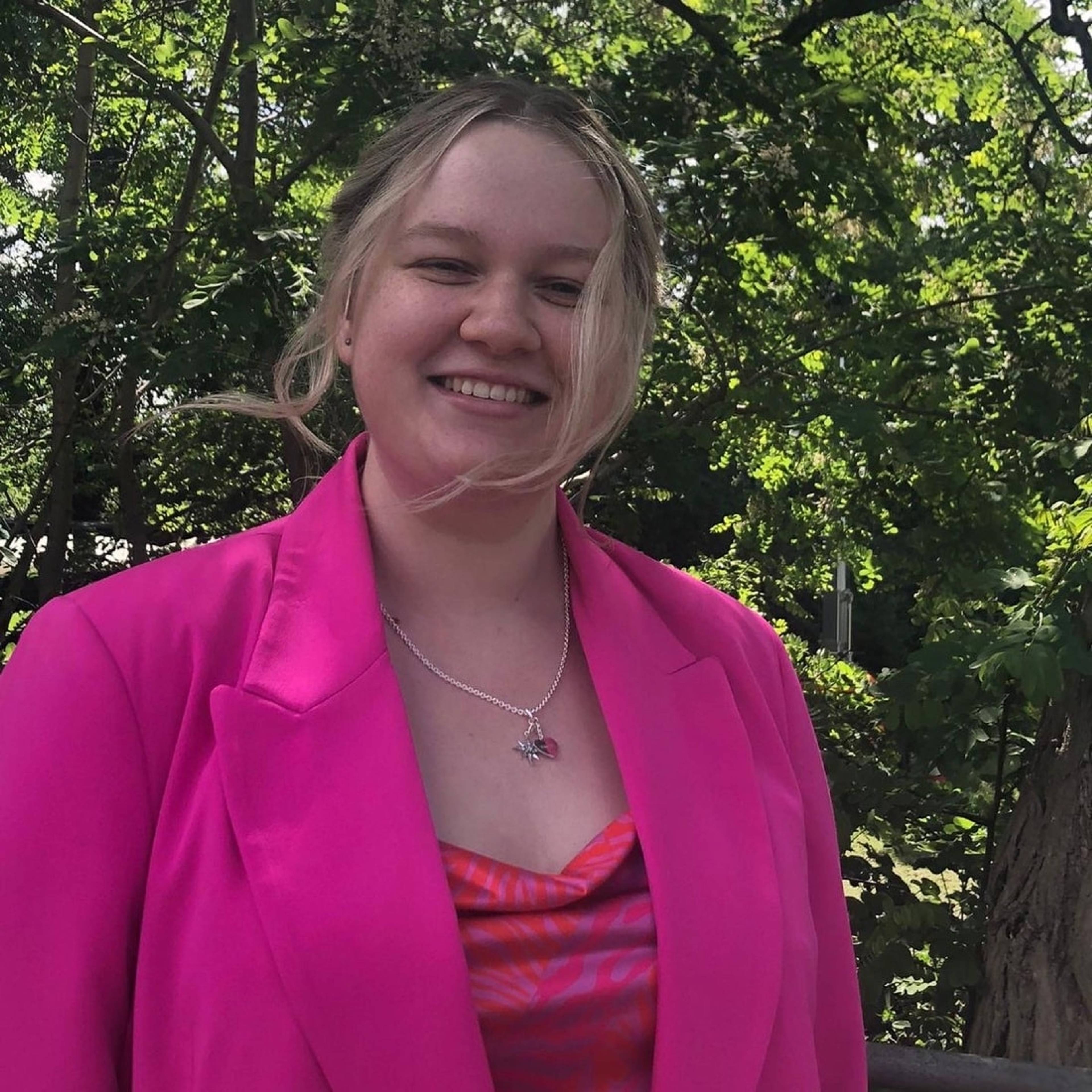August 04, 2023
Having a sibling with an eating disorder

Caring for an individual with an eating disorder can feel isolating and extremely distressing. Research in this area has found that family members often experience high levels of distress and burden due to the pervasive impact of the illness. Studies suggest that when a sibling becomes unwell, it greatly affects the lives of the other siblings and they experience major life changes. However, most existing studies have focused on parents as carers, overlooking the adverse effects that eating disorders also have on the lives of siblings. Our researcher of the month, PhD student Anya Heneghan, aims to shift the paradigm by reviewing the literature in this area. By analysing the findings of 14 eligible studies, Anya’s work explores siblings’ experiences of having a brother or sister with an eating disorder. Her paper is being readied for publication.
She found that eating disorders impact on many areas of siblings’ lives causing immense and inescapable disruption. The amount of parental time and attention devoted to caring for the child with the eating disorder can also lead to siblings feeling less important. Whilst National Institute for Health and Care Excellence (NICE) guidelines for the treatment of eating disorders clarify that family members who take on the role of caregiving, including siblings, need support and education, Anya found that siblings report receiving less professional help than they want or need.
Summary
“The review found that the eating disorder impacts many areas of siblings’ lives, how they view themselves and the world around them, causing immense disruption, intruding on daily living and schoolwork. Significantly higher levels of depression were found in siblings with a sibling with an eating disorder compared to a control group and siblings’ quality of life is negatively impacted.”
Anya’s paper lucidly outlines the great distress that eating disorders cause to the entire family unit. She identifies five core themes of impact; socio-cognitive emotional effects, difficulty expressing emotion, perceived social stigma, negative emotions and a lack of appropriate and systemic support. In recent weeks, she has looked at brand new research, and has identified a sixth theme; reflections on positive by-products of their experiences.
Anya found that siblings often used language of destruction when describing the eating disorder, including words such as ‘destroy’, ‘broken’, ‘devastation’, ‘chaos’ and ‘war zone’. They report that their home environment changes for the worse and that communication with family members becomes more challenging. Some siblings described difficulties with talking to their parents about how they are feeling, despite wanting to, due to concerns about further burdening them. Several studies indicated that siblings minimise their feelings to alleviate their parents’ worry and therefore don’t voice their own needs. Communication between siblings also frequently becomes more limited and restricted, with caution around certain topics including diet-related talk and language relating to body shape and size. Some reported feeling a sense of competition and jealousy over their sibling’s weight loss, which led, in some cases, to siblings also experiencing disordered eating behaviours. Siblings frequently described how they are expected to be mature, independent and cope alone, more than is normally expected at their age – something that Anya terms ‘parentification’.
Anya found that the effect of the eating disorder on siblings is often forgotten about. Four studies revealed that parents’ time and attention are dedicated wholly to the sibling with the eating disorder, leaving their other children feeling neglected and overshadowed. Siblings often describe how family chat about their homework, social life or important life events is minimised and that they believe that the needs of their ill sibling are more important than their own. Siblings were also aware of the stigma surrounding eating disorders and they frequently feared negative judgement from others.
She found that whilst siblings liked receiving support, they did not feel that any of the help offered to them was beneficial. They often said that they were not included in family therapy and had to rely on their parents for information, who were often reluctant to discuss things openly. Anya’s paper is pervaded with a sense of loss. Her review shows that these siblings feel that they have lost contact and closeness with their brother or sister, lost their normality and sense of identity, lost happiness within family life, lost their role as a child and lost their parents’ attention.
Implications
“It is hoped that this review will highlight to professionals the possible risks experienced by siblings, allowing them to provide appropriate support from the outset. Such support can come from the development of new interventions… that integrate siblings in the process of recovery and upskill parents and carers when there is another sibling in the home."
Families supporting a child with an eating disorder are going through an extremely challenging experience. For parents, being there for both their child with an eating disorder and any siblings is undoubtedly difficult. However, Anya has some great tips that might help.
Talk to your children. All of your children need to understand what is going on. Siblings require factual information, given in a developmentally appropriate way. Include them and be honest.
Try to remove burden from them. Remind your child that their sibling is receiving support from a team of professionals and that it is not their responsibility to make them better.
Explain that the whole family will experience changes together. Reassure them that their role is that of a sibling and not of a parent. They should continue to spend time with their sibling doing fun activities that they both enjoy.
Whilst finding time is likely to be challenging, try to spend some one to one time with your other children. This will help to prevent them from feeling less important.
Encourage them to talk about their feelings and seek help when they need it. Help them to identify key people in their lives who they feel comfortable talking to, in case they don’t feel able to confide in you directly.
Set boundaries together. Try to talk openly as a family to establish how involved your child/ren wish to be in treatment sessions and what they feel comfortable with. Providing clarity about what they can and should be doing is vital.
Don’t ask your other children to eat more in an effort to encourage their sibling with an eating disorder to eat. This can lead to disordered eating patterns.
Be cautious about asking siblings to pass on information about their brother or sister. Siblings in the research found being asked to ‘spy’ on their brother or sister particularly distressing and stressful. Parents should exercise caution in asking children to take on the additional burden of watching over their sibling. Relieving pressure from your children is optimal.
Talk to their school. Having a sibling with an eating disorder has a major effect on a child and it may impact on their schoolwork. Talking to your child’s school is crucial. Ideally, support at school shouldn’t be forced upon them. However, identifying a key member of staff who your child feels able to approach would be beneficial and scheduling a weekly chat might be useful. Siblings in the research noted that they liked knowing that support was available should they wish to take it, but that they didn’t want to feel obliged to do so.

Anya Heneghan
PhD researcher at the Institute of Psychiatry
Anya Heneghan is a PhD researcher at the Institute of Psychiatry, Psychology and Neuroscience at King’s College London, with a BSc in Forensic Psychology from Kingston University. Her PhD thesis is dedicated to siblings’ experiences of having a brother or sister with an eating disorder which is largely inspired by her own experience as a sibling in this context. Through her work she hopes to raise awareness of these under-served and often forgotten individuals with the goal of improving support services for siblings.
Anya Heneghan
PhD researcher at the Institute of Psychiatry
Scroll our research gallery

Jul 14, 2025
Do teens with mental health conditions use social media differently than their peers?
As Luisa Fassi, our new Researcher of the Month, comments, "The link between social media use and youth mental health is hotly debated, but hardly any studies look at young people already struggling with clinical-level mental health symptoms". In fact, Luisa's large systematic review and meta-analysis found that only 11% of papers published on the topic since 2007 focused on young people with clinical conditions. Her review also showed that the data used to evidence mental health conditions in these existing studies is not always strong or especially robust. Many report links between social media and mental health on the basis of short self-report questionnaires, where young people are asked about symptoms. Whilst this wasn't found as part of Luisa's review, it is also the case that very few papers in the field differentiate between different mental health conditions, or examine different symptoms or conditions (such as anxiety, ADHD or eating disorders) in isolation. To address this research gap, Luisa and colleagues have recently published a fascinating and nuanced paper. It analyses both quantitative and qualitative dimensions of social media use from a nationally representative survey of 3,340 teens in the UK aged between 11 and 19 years old, which was conducted by NHS Digital in 2017. Rather than gathering mental health data from self-report questionnaires, the young people in the survey underwent a full clinical screening, which included interviews with the young people, their parents and teachers. Information about social media use came from questionnaires completed by participants. They were not asked about specific platforms. Luisa used this data to gather novel insights into how social media and mental health are related in teens who both meet and do not meet diagnostic criteria for a wide range of mental health conditions. The study does not establish any causal links, but it does reveals a range of differences between young people with and without mental health conditions when it comes to social media.

Jun 17, 2025
Navigating the feed: younger adolescents' reflections on algorithmically curated social media
Our latest researcher of the month, Roxana Pomplun, has investigated the interactions, experiences and perceptions of younger adolescents, aged 11, 12, and 13, with algorithmically curated platforms such as TikTok, YouTube Shorts, Spotlight on Snapchat and Reels on Instagram. These kinds of platforms use algorithms to personalise and tailor feeds, harnessing user data to suggest content that the individual is most likely to be interested in and engage with. As such, young people have little control over what they are seeing in their feeds. Tech companies are not yet required to be transparent about the data that they are collecting, but it tends to include demographic information such as age, gender or location, along with use patterns. Whilst these sites dominate the digital lives of tweens and teens, until now they have received little dedicated research attention, particularly in relation to younger users, with most existing studies focusing on older teens. Whilst we know that most social media platforms have age limits of 13, we also know that many younger children are active users, particularly of algorithmically curated platforms like TikTok and YouTube Shorts. Given that early adolescence is a life phase marked by critical neurological development, identity development and heightened susceptibility to mental health issues, deepening our understanding of how younger adolescents engage with social media is vital. Roxana's qualitative research, where a group of young people eloquently explore their own experiences and perceptions, broadens our knowledge of social media use within an age group that appears increasingly aware of the digital influences shaping their online experiences, yet which is still in need of support to fully navigate these ecosystems.

May 15, 2025
Looking beyond smartphone bans
Over the last year or so, there has been a surge in public concern around smartphones and social media. Banning or restricting children’s access to smartphones and social media has grasped the attention of policy makers, schools and parents. A number of countries, including France, Turkey, Norway, Sweden, and regions of the US and Canada have introduced laws, policies or guidance for schools to ‘ban’ or heavily restrict the use of phones. In the UK, there are proposals to raise the age of ‘internet adulthood’ from 13 to 16, and to ban smartphones in schools. The third reading of a private members’ bill on this topic will be heard in parliament in July. Whilst these bans aim to protect children from harm, recent studies highlight a lack of evidence on their efficacy. Along with a team of international experts, our latest Researcher of the Month, Professor Victoria Goodyear, argues that, in isolation, banning smartphone and social media access fails to equip children for healthy use of technology. She suggests that there is a need to shift debates, policies and practices away from a sole focus on restricting smartphone and social media access, toward an emphasis on nurturing children’s digital skills for healthy technology use, and a rights-respecting approach which is underpinned by age-appropriate design and education.

Apr 22, 2025
Encouraging adventurous play in the preschool years
Tune into our podcast interview with April's researchers of the month here. As well as providing numerous opportunities for exploration, joy, and expression, outdoor and adventurous play - the type of play that allows children to take age-appropriate risks - is associated with a range of positive health behaviours and outcomes. Yes, we're talking about the kind of play that might leave us adults with our hearts in our mouths at times, as children start to disappear up a tree, or engage in a rough and tumble game of chase. But its benefits are wide-ranging and known impacts include increased levels of habitual physical activity alongside better mental health and positive mood. In 2019, Dr Hesketh was involved in the creation of physical activity guidelines in the UK, which explicitly note the importance of outdoor play for children in the preschool age group. We know quite a lot about the play habits of school-aged children, but until now, have had significantly less data on their younger counterparts. Our Researchers of the Month, Dr Kathryn Hesketh and Professor Helen Dodd set out to discover how much time preschool-aged children spend playing in a range of indoor and outdoor spaces, and how adventurously they are playing within them. In the first national survey of play in children of this age, they asked over 1000 parents of two to four year olds about their children’s play habits, finding that, on average, children aged two to four spend around four hours per day (outside of educational settings) playing. Just under 50% of this was spent playing outdoors. Their findings shed interesting light on some inequalities in play, even in the youngest age group, which may exacerbate existing inequalities in health.

Mar 17, 2025
Fostering a school culture against bullying: the KiVa Programme
Bullying is an extremely important public mental health risk. Around one in five primary school children report being bullied at least weekly. Children who are bullied are more likely to experience depression and anxiety, and are at heightened risk of mental health issues in adolescence and adulthood. Whilst schools in England and Wales are required to have anti-bullying policies, rates of bullying remain high. Bullying is preventable, but schools need more help to tackle it. Typically, school policies focus on how to handle bullying once it happens. However, evidence suggests that a comprehensive approach involving the entire school to prevent bullying, alongside clear strategies for addressing confirmed cases, is the most effective way to tackle the issue. KiVa is one such whole-school approach, developed in Finland by Professor Christina Samivalli. A large study in Finland which involved 28,000 primary school pupils found that adopting the KiVa programme in Finnish schools significantly reduced bullying and improved children's mental wellbeing. The programme has since been rolled out nationally by the Finnish government and ongoing use of KiVa in Finnish schools is associated with year-on-year incremental reductions in bullying. Along with colleagues, our researcher of the month, Professor Judy Hutchings OBE, has tested the effectiveness of the KiVa Programme in UK primary schools. The study involved over 11,000 children in Wales, Birmingham, Oxfordshire and Devon, and showed a 13% reduction in reported rates of bullying when compared with existing school approaches to tackle bullying.

Feb 12, 2025
When is the right age? Searching for age-appropriate ways to support children's online lives
Currently, children's and young people’s use of digital technology is rarely out of the news. Age limits are debated. Calls for stronger limits are made, and questions are raised regarding whether society should ban 'under-age' children from various aspects of the digital world. 13 years of age is often cited as a digital 'age of consent', though this varies in some countries. Commonly used age limits are largely arbitrary, based primarily on US legislation, rather than evidence. In a recent paper, our researcher of the month, Dr Kim Sylwander, and her co-author Professor Sonia Livingstone, consider age milestones and evaluate whether or not the evidence supports them. Are age limits the optimal way to regulate children’s digital experiences? Does it matter that they are widely contested and often poorly implemented? And are common boundaries even the “right” age, according to evidence from the field of children and digital media? Dr Sylwander persuasively argues that moving forward, a developmental approach can better support children’s rights.

Jan 14, 2025
Showing faith and trust in children nurtures integrity
A new study which explores the development of trust and integrity in children has found that expressing trust in young children encourages them to behave honesty. The research team, including our researcher of the month, Professor Li Zhao, studied whether children were less likely to cheat in a simple test of counting accuracy if the adult administering the test had previously conveyed trust in them. They found that children who were trusted cheated less than those who were not trusted. These findings provide novel evidence about the causal effect of trust on the development of children's honesty.

Dec 17, 2024
Intrinsic reward and word learning
From infancy onwards, humans display an innate motivation to acquire language and to communicate. We start acquiring words as babies and continue to do so throughout our lives. In fact, children are thought to learn over 3000 new words each year. However, relatively little work has focused on why we are motivated to learn words, particularly when it comes to adolescents. Adolescence is a period of great neurological change and sensitivity to learning. It's also marked by changes in reading behaviours. Whilst children become skilled readers between the ages of 10 and 18, this period is also associated with motivational changes in reading, with teens frequently showing a disinclination to read for pleasure. This change often coincides with the transition from primary to secondary school. Policy makers are keen to motivate adolescents to read for pleasure, arguing that it would improve not just literacy outcomes, but also result in substantial economic and societal benefit. Recent research has shown that adults find learning words to be intrinsically rewarding, and that this intrinsic reward facilitates the entrance of new words into long-term memory. In their latest paper, our researchers of the month, Professor Saloni Krishnan and Professor Pablo Ripollés, set out to establish whether the same is true for children and teens.

Nov 14, 2024
Delivering effective menstrual education
Research has shown that menstruation and menstrual cycle symptoms can be disruptive and detrimental to physical, mental and social wellbeing. As many as 93% of teen girls experience dysmenorrhea (severe cramps) and girls with a typical cycle experience 11 menstrual cycle-related symptoms on average, potentially including mood changes, stomach cramps and increased levels of anxiety and fatigue. Adolescents with problematic symptoms have reported a negative impact on school attendance, behaviour, confidence around peers and participation in physical activity. In the United Kingdom, evidence suggests that menstrual health education delivered by teachers generally focuses on menstrual cycle biology, as opposed to management of menstruation and menstrual cycle related symptoms. Our latest researcher of the month, Dr Natalie Brown, set out to understand young people’s perceptions of menstrual education in schools and their experiences of menstruating whilst at school, including within physical education. Her study involved nine focus groups with 10-15 year old female pupils attending primary and secondary schools across England and Wales. Pupils highlighted that, in their experience, menstrual education is limited and noted that the menstrual cycle impacts negatively on their school experience, affecting participation in sport and school attendance generally. Participants highlighted a need for more support and information regarding understanding and managing periods in school.

Oct 17, 2024
How influential is social media on young people's mental health?
A significant body of evidence tells us that young people's mental health has decreased over time, and a potential link between social media use and this mental health decline has triggered wide interest and concern. Research into social media use and mental health is being conducted at a rapid pace but, so far, findings are far from conclusive. Our new Researcher of the Month, Dr Margarita Panayiotou, adds to this body of work. She led a team of researchers who recently published a study involving thousands of young people in the UK. It set out to explore the interplay between social media use and teens' mental health, wellbeing and social life, and found that when considering the complex combination of multiple factors, things such as a lack of family support are arguably more important for adolescent mental health than social media use.

